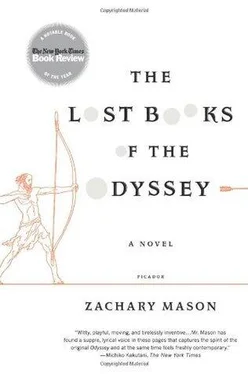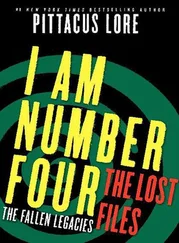One night a black cloud of grief descended on Agamemnon and he fell to brooding on the apparent perfection of his ignorance, exemplified by his failure to capture a single city in years of siege though he had ten times as many men as his enemy and god-like heroes ran to do his bidding. The failure of his knowledge, he reflected, extended beyond military strategy and encompassed all the world, even unto the names of his servants, the topography of his palace and the history of the blade hanging at his side. He called together his wisest men, Nestor, Palamedes and wily Odysseus, and commissioned them to write for him a book that clearly and explicitly explained everything under the sun, even unto all the mysteries hidden within the earth, the true names of every living thing, the number of grains of sand on the Troad, the secret histories of the gods and the tumultuous futures of the stars, all to be writ fair in no more and no less than a thousand pages.
The counselors conferred in low voices out of the king’s hearing, speaking of the state of the king’s mind and vanity, the innate interest of the task, whether the taskmaster would be able to recognize a solution, and finally whether their combined lifetimes would suffice to write the required book. At last they turned to the throne, bowed as one, and said it would be done. That night they left Troy followed by scribes and cartloads of gold, promising to return no later than as soon as they got back.
When they returned the king’s beard had turned silver and his limbs were twisted like oak branches. The palace was deeper than when the sages had left — as floods and settling sands buried the first layer of tunnels new ones were excavated in the higher strata and the remnants of the old levels were relegated to storage, dungeon and thief-road. As for Troy, at nightfall bonfires smoked and crackled atop its towers and when the moon was full the sounds of a night market drifted down from its walls. From the roof of Agamemnon’s palace the marketers’ sapphire and emerald lanterns could be discerned, bobbing like distant fireflies in a wind that brought the scents of cardamom and cinnamon.
The three sages bowed before their sovereign and with a flourish presented a heavy book bound in tarnished silver containing a thousand thick, densely written pages. When opened the book released a waft like hot iron in a winter forge. Within Agamemnon read of many things:
The history of his ancestors the Atreides.
The detailed plans of the castle on the highest peak of Mount Olympus, and what dolorous event will transpire there on the day the engines of the world shudder, hesitate and begin their slow deceleration.
The mathematics underlying the populations of herring in the sea, the evolution of the stars and the fencing style of a certain little-known sect of Sicilian masters, and how these disparate things are secretly ruled by a single idea.
A survey of the many layers of the Earth and the currents and tidal schedules of its vast seas of magma.
A lexicon of the hidden language of cities, in which buildings are nouns, the inhabitants verbs, and empty spaces adjectives in an endlessly changing narrative.
A certain General Sun’s theory of warfare, based on modern scientific principles.
The gossip and scurrilous propensities of every whole number from zero up to the largest number that had yet been conceived of by men.
… and a great many more topics besides. It had been impossible to fit this wealth of knowledge into a mere thousand pages (even with letters no larger than a grain of the ubiquitous white sand) so the sages had made the book read differently and coherently forward and backward, from bottom to top and top to bottom, if every other word was skipped, and if every third letter was ignored and so on.
Agamemnon read until his eyelids were heavy and his chin sank onto his breast. He gave a start, lifted his head and closed the book with a click. The sages silently awaited their due.
“This is not it. This is not it at all,” said the king. “I wanted a book that gave me some understanding, not this cabinet of wonders and analogies, this encyclopedia of encyclopedias tricked into a millennium of pages. I am very disappointed. However. I will not punish you for your failure, in part because I see in your faces that you truly thought you had done well, and anyway, I have no wiser counselors to hand. So I will give you another chance, and this time I will make my orders exceedingly simple. Find the sentence, the single sentence, that contains the sum total of all wisdom.” The sages bowed and withdrew, leaving the palace with caskets of jewels and companies of armed men.
They were gone for a very long time. When they returned, Troy had been abandoned, its moss-stained walls as worn as mountain-sides, the rusting hulks of war machines decaying on its parapets amid the tatterdemalion shells of factories. The levels of the Greek palace had multiplied, gone deeper — now it resembled a vast inverted castle, its battlements and towers soaring into the depths of the earth. Now and then a district was separated by a landslide and till the miners could reconnect them to the king’s rule they lived with their own laws and minted their own coins. The years had turned Agamemnon hard and bright, scouring away everything patient and human in him. Palamedes, who exceeded even Odysseus in seeing into the inner workings of things, approached Agamemnon and presented him with a dagger sheathed in a red cloth. The king drew the mirror-bright double-edged blade and on both sides read, “And this, too, shall pass.”
For a long time the king thought deeply and seemed almost to smile. “This is better. Here is a comfort in sorrow and a check on joy. But… even this is not enough. I have left too much room for interpretation and error, so I will rephrase the task one final time. Bring me everything, the skies and their clouds and the rain pouring into the oceans and every grain of sand on all the beaches, every ant crawling on a stone and every god in his pomposity, all in a single word.” Showing no surprise, the counselors dispersed yet again. This time each went a different way from Troy and took nothing but the robes on their backs.
Seasons came and went with unseemly haste and in time Odysseus returned alone. Troy was a memory and the palace a kind of madness to which cartographers were susceptible. Odysseus took the king’s skeletal bone-colored claw and slipped onto it a silver ring set with a blue gem the color of the western sky in the failing of the day. “Look into the gem, sire. There is your word.” Agamemnon looked but what he made of the word is not recorded because moments later he slumped forward, the interminable tyrant finally dead. Also not recorded is whether Odysseus had poisoned the ring or whether he had found the word and it sufficed.
Odysseus set foot on Ithaca trembling with wrath, his spear poised to fly through the heart of the first man unwise enough to cross him. He passed unopposed up to his old hall where instead of enemies he found his kinsmen turning to face him with wide eyes, exclaiming in wonder — he first thought it was a war-cry and nearly slew them. They drew him in among them, touching and praising him, all astonishment and delight except for Penelope (whose face had been the ground for the figure of his dreams), hardly aged and oddly quiet, lingering alone at the back of the crowd. He pushed his way through to her and reached out to touch her cheek but she evaded him and the crowd looked away, suddenly quiet, and Odysseus was aware that he had blundered. The next day they showed him her grave. For the rest of his time on Ithaca Odysseus avoided looking at her as she lingered in his house, staring out the window and idly running her fingertips over familiar things. He mastered his desire to seize her legs and kiss her thighs and hands for he knew she would turn to ash and shadow as soon as he touched her and moreover nothing is more disgraceful than to acknowledge the presence of the dead.
Читать дальше












